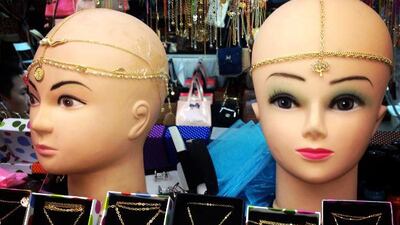On Dubai’s Hatta-Al Ain motorway lies the Dragon Mart, one of the largest trading centres for Chinese products outside China.
Dangling from its ceiling are many Chinese spheres coloured bright red. The market can be an amusing place and the deeper you go into it, the better it gets.
Blending the smells of Arab Oud incense sticks with tasty Chinese food, the market is an eclectic mix. It is a rare place that combines the sounds of an ancient Chinese temple gong with the recent South Korean pop song Gangnam Style, which was a hit around the world.
On the top floor is a huge furniture shop, full of gold-plated wooden chairs and sofas that match the taste of a fine Middle East home. At the centre of the shop sits the Chinese-born Sara Zhu, 25, dressed in an elegant modern suit. Ms Zhu came to Dubai two years ago after learning English in China.
“I came here because I want to see the world,” she says with a wide smile. “Here, we are trying to meet a market need. We work with wholesale and retail, depending on the manufacturing quantity. If the quantity is big enough, we create a mould for it in China.”
Like Ms Zhu, many Chinese settle in this country hoping to find fruitful business opportunities. They aspire to bring the products of their country to the world. Data from Dubai’s Chamber of Commerce shows that from January to September last year, the UAE’s non-oil trade with China was valued at Dh50 billion, making it the Emirates’ fourth-largest trading partner. Imports from China were at Dh44.3bn, while exports to China reached Dh4bn for the period.
Reductions in red tape have helped to spur trade further. Cui Bing, 27, who goes by the western name John, has been managing a shop selling massage products and air purifiers for seven years. Mr Bing says UAE government procedures have eased in recent years.
“Now it takes a day to bring products in, before it used to be three to four days,” he says.
Mr Bing says it is also easier to process visa for Chinese workers now, especially as Dragon Mart has become well-known in recent years.
Moving to the ground floor, three Chinese women are chatting in a shop full of colourful lip-shaped phones, hello-kitty calculators, and glittery bags.
“Our clients are mostly women from Saudi Arabia, Kuwait, and Qatar,” says CuCu Quan Xiao, 26, brushing her dyed-blonde hair from her face. “They like crystals, the bling-bling,” she adds, giggling.
In a tiny mobile shop next door, Chen Xin, 25, stands with his white T-shirt tucked in a pair of jeans.
“Customers here think that Chinese products have low price. [But] good quality must have high price,” he says, pointing to a display of tablets devices. “We have tablets that look like other brands, but the CPU [central processing unit] is different. They are sold for Dh250, but people come and say other places sell them for Dh150 or Dh100,” he complains.
Despite the bustle, traders at Dragon Mart say they some of the problems elsewhere in the region have had an effect locally.
“Now the business is getting really slow,” says Ms Zhu.
“Before we used to have wholesale traders coming from Iran and Syria. But now it’s not the case.”
Trade between the UAE and Iran dropped significantly from an estimated US$14bn in non-oil goods in 2007 to just $4bn in the first half of last year after the tightening of sanctions on Iran over its alleged development of nuclear weapons production capability. The Arab Spring in 2011 also hit many Chinese traders on this country.
“The business before 2008 was amazing,” says Qin Hong Zeng, a young Chinese manager at a wall paper shop.
“Countries like Syria, Iran, and Egypt are not stable. We used to get wholesale traders from these countries.”
Mr Zeng says the high cost of labour, transport and a stronger yuan has also hit business and profits. The shop he works at owns a factory in China with a team that buys designs from all over the world.
Dragon Mart traders also face challenges from the fancy new malls that have opened in Dubai in the past few years. The almost 10-year-old Dragon Mart has started to look tired by comparison.
However, with a touch of National Day decorations last week, mixed with the celebrations to mark Dubai’s victory in the contest to host Expo 2020 – the hype was on.
“I’ve been to all the emirates, but still feel I don’t know the country very well,” says Ms Zhu.
“However, I realise that I have got some connection with the country,” she adds, saying Dubai’s winning bid to host Expo 2020 drove the point home for her.
“The Expo win, I am excited about it. I think I am proud after all.”
selgazzar@thenational.ae

